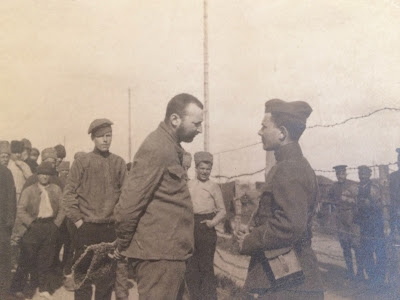Veterans Day was either Friday or Saturday of last week. Unlike other federal holidays that are observed on the closest Monday to the actual holiday, Veterans Day is always observed on the exact day itself -- November 11. I'm confused though because while the 11th fell on Saturday this year, the federal holiday was observed on Friday but somehow the mail carrier still delivered our mail that day.
My confusion is not the point, though. We observe Veterans Day on the 11th of November because that's when the armistice for World War I went into effect, even more specifically the guns went silent at 11 am, making it final on the 11th hour of the 11th day of the 11th month. And in my family, this is significant because both of my grandfathers served in World War I.
My father's father, Abraham B. Schwartz (or Beb as he was known from childhood) was 26 when the U.S. entered the war. He was a fully qualified physician and therefore entered the U.S. Army as an officer. Although I knew him well, his war experience was never something that we discussed. Moreover, his military records were among many that were destroyed by a massive fire in 1973 at the National Personnel Records Center in St. Louis. So what I know of his Army experience is pieced together from photos, other official records, and a few jottings in his handwriting and that of my grandmother.After being inducted in Milwaukee in late 1917, he received his basic training at Fort Riley, Kansas. In August 1918, he boarded the Leviathan, en route for U.S. Base Hospital 82 in Toul in northeastern France. This was just about 25 miles from St. Mihiel, where a major battle was fought in September of that year. Beb was not a surgeon so I'm not sure what his role might have been in such an engagement.
The rest of his service is a bit of a mystery, the only clues being the photo below which is labeled on the back "interviewing Russians at a displaced persons camp, 1919" and a note in his official Abridged Prayer Book for Jews in the Army and Navy of the United States, that he was a volunteer with Russian prisoners of war. Perhaps the Yiddish spoken in his childhood home or phrases in Russian that his parents brought with them when they emigrated from what is now Belarus was helpful?
He was discharged in August 1919, returning to Milwaukee where he practiced pediatrics until he turned 80.
My mother's father, Sydney Freedman, had a different experience. He died on my 5th birthday so I only have a few memories of him but fortunately, I do have a few facts. In the fall of 1917, he was two years out of high school, working as a salesman for E. Kirstein and Sons, a manufacturer of optical products in Rochester, NY. (Two interesting footnotes here: First, the company held his job and paid a portion of his salary throughout his military service. Second, the "sons" of the company title included Lincoln Kirstein, perhaps best known as one of the founders of the New York City Ballet and who also served in World War II as one of its Monuments Men, locating and retrieving artworks stolen by the Nazis.).
He did his basic training at Fort Dix, New Jersey where the Thanksgiving meal included both oysters on the half shell and roast loin of pork, items that certainly would not have been eaten in his Jewish home. In May 1918, Battery D 19th Field Artillery shipped out for Europe on a ship called Tunisian, arriving almost a month later. New York State maintained records of soldiers in its own archive which is how I know that his unit engaged at Vosges, St. Mihiel, Thiacourt, and "Pogney Front", the last of these yielding nothing on a Google search. A lifelong joker, Private Freedman told my mother that he served in the cavalry and his job was to clean "the part under the horse's tail."
When the armistice came, he was sent to be part of the U.S. forces supervising the evacuation of the Germans from Luxembourg, billeting with a family in Itzig, until his discharge in July 1919. My mother-in-law's family came from that area and left aunts, uncles, and cousins behind, the descendants of whom the family remains in touch with to this day. It is crazy for me to consider that my grandfather, this short, portly Jewish fellow from New York, might have lived with the Catholic farmers related to my husband, and what they might have made of each other.
His future brothers-in-law, Sam and Joseph Cohen, were not inducted until May 1918, and they too never saw any overseas action. Their basic training took place at Camp Sheridan near Montgomery, Alabama and I imagine (although can't say for sure) that this was the furthest they'd ever been away from home.
Happily for their mothers, all these men came home in one piece (because if not, I would not be here at all). Sadly for all of us, World War I did not turn out to be the war to end all wars.






No comments:
Post a Comment